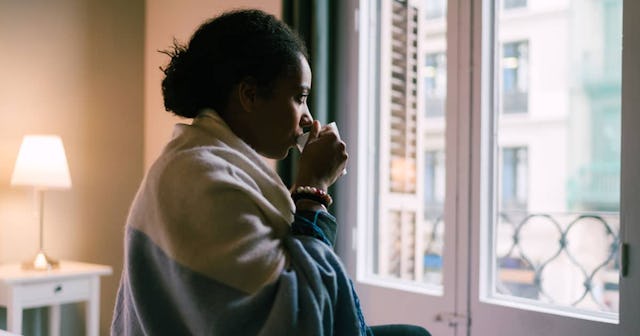I'm A 36-Year-Old Widow, And My Loss Did Not Make Me 'Stronger'

This past summer, I took my two children to their first concert. My little family of three braved the traffic into Manhattan, and the subway into Brooklyn, and the lines for entry and band T-shirts and restrooms, to see an opening act and headliner who’ve been dominating the Top 40 radio scene for months.
Both acts were in their early twenties, and in between songs describing love and heartbreak they spoke to the crowd about life, about coming back stronger after being knocked down. With each word, the crowd, teeming with teenagers and teeny-boppers accompanied by parents like me, roared its appreciation, finding inspiration in the promise of something bright and brilliant waiting just on the other side of struggle.
Once upon a time, I might have agreed with them; I might have been able to cheer along.
But I couldn’t.
Through both acts, I found myself rolling my eyes and mentally hashtagging their monologues with a snarky #things21yearoldssay.
Maybe I just don’t like platitudes anymore. Maybe I’m bitter. As a 36-year-old widow solo parenting two kids, I suppose I’m allowed to be cynical and bitter once in a while, maybe even all the time.
But cynical and bitter is not how I want to live my life post loss because it’s not how I lived my life pre-loss, when I believed in the inherent fairness of the universe and in simple truths like happily ever after.
I don’t believe in those anymore. After standing by helplessly as glioblastoma (a brain cancer with dismal survival statistics) stole my 40-year-old husband, first in mind, then body, then breath and soul, how could I? I can’t, but I can find some middle ground, some wild, uncharted space between hope and despair, a balanced place between happily ever after and there’s no point in trying, a perfect edge where the glass isn’t half-full but neither is it half-empty—because it simply is a glass, and in some light it looks a little murky and other light, it is capable of scattering rainbows across the walls.
If I was actively choosing to live without that hard knot of cynicism and bitterness, then what exactly bothered me about the easy idea these performers offered up to their young fans; why did I take issue with these two artists telling 30,000 people that they will come back stronger after hardship?
Because, bitterness aside, they were wrong. You won’t always come back stronger. (#sorrynotsorry?)
SensorSpot/Getty
Looking at my family of three that just a year ago had been four, I didn’t feel stronger. My world had been devastated, and nothing bright and beautiful stood on the other end. I wasn’t stronger. Maybe that was simply a failure on my part, but I didn’t feel like a failure. I’d gotten my little family of three to a concert, over a bridge and through a tunnel and across an arena filled with families who looked like ours had once looked, all while bearing the dense weight of an absence. For more than a year, I’d lived with husband-sized holes in my heart, and I was still living, but I wasn’t stronger. I was something else.
The horrible truth is that some things just break you. Your world might crumble around you in a way so devastating, it’ll just hurt. And there won’t be a light to crawl toward, there won’t be a lesson to have learned and grown from. You’ll just break, shatter into so many different pieces that it won’t be possible to find every sliver and shard of yourself, let alone gather them all to rebuild into something sturdier and less breakable than before, something “stronger.”
But also, as is so often the case, the truth, at least as I’ve experienced it so far, is more complicated and nuanced than it seems at first glance. Because the truth is also that, though you may be shattered into too many pieces, though your world may have crumbled and the light gone out and the lesson failed to present itself, you won’t stop breathing.
And that breath isn’t strength. It’s reflex. It’s muscle memory. It’s survival. And somehow, with that breath, that daily inhale and exhale, days pass, and then weeks, and then by accident you might manage to look up and see that the simple, instinctive act of breathing has allowed you to collect some of the pieces, build something from the ashes. Something that doesn’t look quite right, but not wholly wrong, either. And yes, some parts will surely be stronger, fused together through breath and spirit and fragments of hope, fused with an intensity that will astonish and amaze you every day. But other parts, maybe the majority of parts, will remain broken, missing or warped and misshapen, and you’ll wonder how you managed to stand, to breathe, to live with all those damaged pieces, all those holes. But you did, and you will. And you won’t be better for building from the ashes.
What I would tell those young performers, what I would want them to share with that roaring crowd of parents and young people, all who no doubt all have stories and struggles that have broken them, and who have come back and maybe also don’t feel stronger, is this: sometimes “stronger” is an unfair benchmark to which you may fall short.
But you can be something else, something that exists in that wild uncharted space between hope and despair, something new and patched together and perfectly imperfect, something strong and vulnerable and broken and beautiful. You can be the you that you rebuilt through breath and instinct and muscle memory, the you that is surviving, and sometimes, even thriving, arcing rainbows across walls.
Simply put: maybe you won’t be stronger, but you’ll be.
And that’s always enough.
This article was originally published on